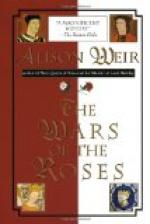“The very heavens have put on the livery of the Red Rose!” cried Edward gaily, as he pointed to the vivid red of the east; and Paul smiled, and tried to banish from his mind the old adage learned at his nurse’s knee, to the effect that a red morn was the herald of a dark and dreary day.
They had ridden a matter of some five miles forth in the direction of the great road to London—as it was then considered, though we should scarce call the rude tracks of those days roads—when the quick eye of Paul caught sight of a little moving cloud of dust, and he drew rein to shade his eyes with his hand.
Edward followed his example, and together they stood gazing, their hearts beating with sympathetic excitement. How much might the next few moments contain for them of triumph or of despair! for from the haste with which these horsemen rode, it was plain they were the bearers of tidings, and if of tidings, most likely those of some battle, in which the King Maker and the king he had first made and then driven away would stand for the first time in hostile ranks. Together they had been victorious; what would be the result when they met as foes?
Nearer and nearer came the riders, looming through the uncertain morning mist, and emerging thence two jaded, weary figures, their horses flecked with foam, nostrils wide, chests heaving, showing every sign of distress; and Paul, recognizing in one of the riders a follower of the Earl of Warwick, called upon him by name, and bid him speak his tidings.
“Lost—lost—all lost!” cried the man, addressing himself to Paul, unconscious of the identity of his companion; “the battle is fought and lost. The armies met on Barnet Heath. The Earl of Warwick, the great earl, was there slain. His Majesty King Henry is again a prisoner in the hands of Edward of York. Today he makes his triumphant entry into London, which will open its gates to him with joy and receive him as king.”
Paul sat rigid and motionless as he heard these words. He did not dare to look at young Edward, who sat beside him as if turned to stone. The second messenger, who had had a moment to draw breath whilst his fellow had been speaking, now broke in with his share of the terrible news. He had seen the prodigies of valour performed by the mighty earl. He had witnessed the death of that warrior—such a death as was fitting for one of his warlike race. The testimony of eyewitnesses could not be doubted. The fatal day had again been hostile to the cause of the Red Rose, and the mournful cry of those who had seen and shared in the fight, as they fled pellmell from the field, had been, “Lost—all lost! the House of Lancaster is utterly overthrown!”
Mournfully the little procession turned itself and rode back to the Abbey. Edward had not spoken one word all this time, and the messengers, who had now learned who he was, fell to the rear, and observed an awed silence. But their tale had been told. They had said enough. The worst was made known, and not even Paul dared venture a word of consolation, or seek to know what was passing in the mind of the prince, whose fair inheritance seemed thus to be slipping away.




